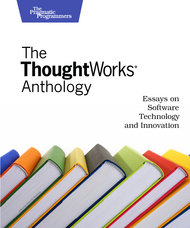 This isn't a book review because it's considered bad taste to review books in which you participate. But, The ThoughtWorks Anthology is an interesting project, and I thought I could provide some perspective on it's genesis. TWA offers a glimpse of why ThoughtWorks is such a cool place to work: lots of people passionate about technology, who care about changing the IT industry.
This isn't a book review because it's considered bad taste to review books in which you participate. But, The ThoughtWorks Anthology is an interesting project, and I thought I could provide some perspective on it's genesis. TWA offers a glimpse of why ThoughtWorks is such a cool place to work: lots of people passionate about technology, who care about changing the IT industry.As you may already know, I compiled two other anthologies, the 2006 and 2007 No Fluff, Just Stuff Anthologies (editing is too strong a word, I was mostly just wrangling articles from writers and organizing stuff). Those were easy because we had a hard deadline: it doesn't make sense to release the 2006 anthology in 2008. Shortly after the first No Fluff, Just Stuff anthology was published, several people at ThoughtWorks (including Martin Fowler and Rebecca Parsons, the ThoughtWorks CTO) and I started talking about the possibility of a ThoughtWorks anthology. I don't mean to suggest that it was my idea; they were just talking to me about logistics. It was decided that Rebecca would edit it, and solicitations for articles went out. Lots of ThoughtWorkers expressed an interest (including me), and writing began.
But three problems manifested: first, no implied deadline existed, because this wasn't a dated book. Two, everyone working on and contributing to the book had day jobs, actually doing the stuff they were writing about in lots of cases. In addition to their day jobs, many were involved in open source projects: ThoughtWorkers contribute a lot to open source projects. And, third, ThoughtWorkers are notoriously ADD. Rebecca had the unenviable and well nigh impossible job of cat herding a bunch of ThoughtWorkers under the above constraints towards creating the anthology. And, of course, Rebecca is insanely busy as well. But, obviously, she made it happen. It took a while, but it's out now. It covers the gamut of things that interest ThoughtWorks, from project management to pretty hard core technical stuff, with some forward looking tidbits thrown in. The ThoughtWorks Anthology has essays by Roy Singham (the Roy of Roy's Social Experiment), Martin Fowler, Rebecca Parsons, me, Jeff Bay, Michael Robinson, Tiffany Lentz, Stelios Pantazopoulos, Ian Robinson, Erik Doernenburg, Julian Simpson, Dave Farley, Kristan Vingrys, and James Bull. The article titles give a glimpse of the range of information in this book: Solving the Business Software "Last Mile", One Lair and Twenty Ruby DSLs, The Lush Landscape of Languages, Polyglot Programming, Object Calisthenics, What Is an Iteration Manager Anyway?, Project Vital Signs, Consumer-Driven Contracts: A Service Evolution Pattern, Domain Annotations, Refactoring Ant Build Files, Single-Click Software Release, Agile vs. Waterfall Testing for Enterprise Web Apps, and Pragmatic Performance Testing.
Anthologies are currently all the rage. No only the No Fluff, Just Stuff ones, but O'Reilly's Beautiful Code (and a rumored upcoming one on architecture), and, of course, this one. Anthologies are nice because you can read them in little bursts. I think this one has both interesting stuff and does ThoughtWorks proud as a company. Kudos to all the writers and Rebecca for pulling it off. And don't ask her about a sequel, at least not yet: she needs time to heal.

 I'm speaking at the upcoming
I'm speaking at the upcoming 

